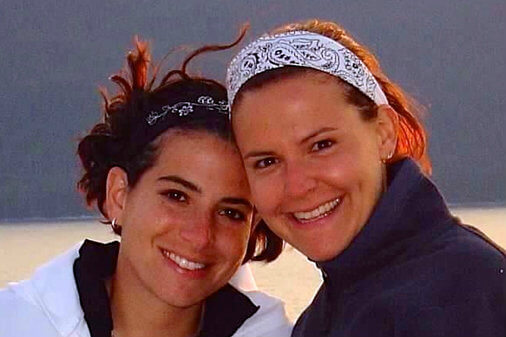Amy Sandler and Niki Quasney. | LAMBDA LEGAL
A federal judge has ordered Indiana officials to recognize the marriage of a lesbian couple, in which one spouse is battling ovarian cancer, until their lawsuit can be decided on the merits.
The May 8 preliminary injunction from US District Judge Richard L. Young extended an earlier restraining order requiring the recognition of the Massachusetts marriage of Nikole Quasney and Amy Sandler, Indiana residents who wed last year after a 2011 civil union in Illinois.
The office of Indiana Attorney General Greg Zoeller, a Republican, responded to Young’s injunction by announcing it will appeal to the Seventh Circuit Court of Appeals.
Temporary injunction imposed as case is decided on merits; state appeals
Quasney and Sandler have been partners for more than 13 years and are raising two young children together. Quasney was diagnosed with ovarian cancer in 2009 and given a five-year survival prognosis. Although she has been in remission off and on during that period as a result of chemotherapy, her cancer is no longer treatable since its most recent recurrence last month.
The couple joined several other same-sex couples in suing Indiana for its denial of same-sex marriage rights and its refusal to recognize out-of-state marriages. All of the couples filed a motion for preliminary injunction, but at this point only Quasney and Sandler’s motion was before the court, given the likelihood of Quasney’s death in the near future.
Applying Seventh Circuit precedents to his analysis, Young found that the couple has demonstrated some likelihood of success on the merits, the irreparable harm they would suffer without the injunction, and the lack of other legal remedies to repair that harm. The task before Young was to determine whether the couple’s need for relief outweighed the state’s interest in preserving the status quo until the case can be decided.
In assessing the couple’s prospects for victory on the merits, Young noted the long string of favorable federal district court decisions since last June’s Supreme Court ruling striking down the Defense of Marriage Act’s ban on federal recognition of legal same-sex marriage.
He also found that the Supreme Court’s decision in January to stay the Utah marriage decision and the subsequent stays issued by federal judges who ruled in favor of marriage equality did not necessarily mean he could not issue a preliminary injunction to take effect immediately. His ruling provides relief to just one couple, he pointed out, in a state with a population of 6.5 million, so it did not present the same issues as a broad order requiring marriage equality rights across the board.
He therefore concluded that the state’s argument the injunction would cause confusion about whether state law still barred same-sex marriage lacked merit.
Young found that the couple is suffering irreparable harm in Quasney’s need to leave the state to get care in a hospital where her marriage is recognized and from the loss of dignity they are enduring.
Young dismissed Indiana’s claim it has “a valid interest in upholding… a law that violates these constitutional guarantees [of equal protection and due process].” While acknowledging that a broadly applicable injunction would “cause confusion with the administration of Indiana’s marriage laws and to the public in general, that concern does not apply here.”
Young ordered that if Quasney dies while the injunction is in effect, the state department of health must “issue a death certificate that records her marital status as ‘married’ and lists Plaintiff Amy Sandler as the ‘surviving spouse.’”
In a statement responding to the attorney general’s appeal of Young’s injunction, Camilla Taylor, the marriage project director at Lambda Legal, said, “This is a shameful display of cruelty towards a loving couple with two children whose marriage is vital as they battle an aggressive cancer and fight to be together. This is one family in all of Indiana. Their marriage doesn’t harm anyone in Indiana, it simply protects them and their children.”



































